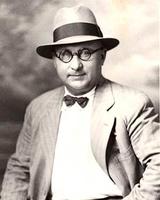 | Back to e-WV
| Back to e-WV
 The West Virginia Encyclopedia
The West Virginia Encyclopedia
 | Back to e-WV
| Back to e-WV
 The West Virginia Encyclopedia
The West Virginia Encyclopedia

In August 1931, Harry F. Powers, the ‘‘Bluebeard of Quiet Dell,’’ was charged with killing Dorothy Lemke of Massachusetts and Asta Eicher and her three children of Illinois. The bodies were found at Powers’s home in Quiet Dell, near Clarksburg. Personal effects of the victims were also found on the premises.
Powers had obtained information about these two wealthy widows from the American Friendship Society of Detroit, a match-making organization that specialized in introducing prosperous singles. Powers (using the alias Cornelius O. Pierson and describing himself as a civil engineer) had promised to marry each of the women, thus luring them to their destruction. He had been previously arrested on lesser charges as John Schroeder and as Herman Drenth, perhaps his real name.
Standing five feet four inches, weighing 175 pounds, and wearing thick glasses, Powers ran a small grocery store in Clarksburg’s Broad Oaks neighborhood. The sensational story attracted so much attention that Powers’s trial was held at the Moore Opera House in Clarksburg to accommodate the crowd of spectators. Powers was tried and convicted of Lemke’s murder and sentenced to death by hanging. His wife, Luella, who he had met through her own “lonely hearts” ad, denied all knowledge of her husband’s criminal activities and was never charged with any crime.
Powers was executed by hanging at the state penitentiary in Moundsville on March 18, 1932. The gruesome story of his victimization of the Eicher family inspired Night of the Hunter, a 1953 novel by West Virginia native Davis Grubb which was later made into a critically acclaimed motion picture. In 2013, Powers and the Eicher murders were the subject of the novel Quiet Dell by author Jayne Anne Phillips, a native of Buckhannon.
Written by Christine M. Kreiser
Bumgardner, Stan & Christine Kreiser. 'Thy Brother's Blood': Capital Punishment in West Virginia. West Virginia Historical Society Quarterly, (March 1996).
Clipping Files. State Archives.